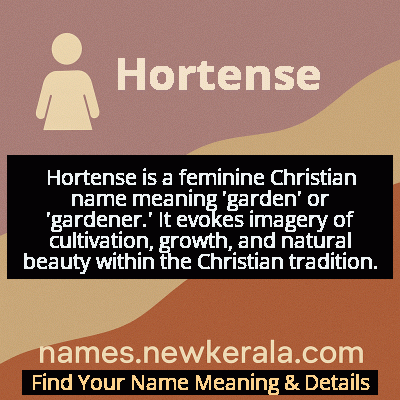Hortense Name Meaning & Details
Origin, Popularity, Numerology Analysis & Name Meaning of Hortense
Discover the origin, meaning, and cultural significance of the name HORTENSE. Delve into its historical roots and explore the lasting impact it has had on communities and traditions.
Name
Hortense
Gender
Female
Origin
Christian
Lucky Number
5
Meaning of the Name - Hortense
Hortense is a feminine Christian name meaning 'garden' or 'gardener.' It evokes imagery of cultivation, growth, and natural beauty within the Christian tradition.
Hortense - Complete Numerology Analysis
Your Numerology Number
Based on Pythagorean Numerology System
Ruling Planet
Mercury
Positive Nature
Adventurous, dynamic, curious, and social.
Negative Traits
Restless, impatient, inconsistent, prone to indulgence.
Lucky Colours
Green, white.
Lucky Days
Wednesday.
Lucky Stones
Emerald.
Harmony Numbers
1, 3, 9.
Best Suited Professions
Sales, marketing, travel, entertainment.
What People Like About You
Versatility, charisma, adventurous spirit.
Famous People Named Hortense
Hortense de Beauharnais
Queen of Holland
Mother of Napoleon III and influential figure in French politics
Hortense Mancini
French noblewoman
One of the most celebrated beauties of her time and niece of Cardinal Mazarin
Hortense Powdermaker
Anthropologist
Pioneering cultural anthropologist known for her studies of Hollywood and race relations
Hortense Allart
Writer and feminist
French novelist and early feminist thinker who influenced George Sand
Name Variations & International Equivalents
Click on blue names to explore their detailed meanings. Gray names with will be available soon.
Cultural & Historical Significance
In Christian contexts, while not a biblical name, Hortense has been used among Catholic families, particularly in France and French-speaking regions, where it carries connotations of refinement and historical depth. The name's garden-related meaning also connects it to Christian symbolism of paradise and spiritual cultivation. Throughout literature and art, Hortense has appeared as a character representing sophistication and European elegance, often depicted as intelligent, cultured women with strong personalities and refined tastes.
Extended Personality Analysis
Women named Hortense are often perceived as refined, intelligent, and possessing natural elegance. They tend to be cultivated individuals with sophisticated tastes and a deep appreciation for art, literature, and beauty in all forms. The garden symbolism suggests someone who nurtures relationships and ideas carefully, much like a gardener tends to plants. Hortenses are typically seen as patient, methodical, and possessing a quiet strength that allows them to weather challenges with grace.
They often exhibit strong organizational skills and attention to detail, combined with creative flair that makes them excellent at bringing projects to fruition. While sometimes reserved in new situations, they form deep, lasting connections with those they trust and are known for their loyalty and discretion. Their combination of practical wisdom and aesthetic sensitivity makes them particularly adept at creating harmony in their environments and relationships. The name suggests a person who values tradition but also understands the importance of growth and adaptation.
Modern Usage & Popularity
In contemporary times, Hortense has become quite rare, particularly in English-speaking countries where it peaked in popularity during the Victorian era. The name currently experiences occasional use among parents seeking vintage, aristocratic names with botanical connections. In France, while no longer common, it maintains a classic status and occasionally appears in literary or artistic families. The name's decline in the 20th century can be attributed to its perceived old-fashioned quality, but it has recently shown signs of potential revival as part of the 'grandmother name' trend. Modern usage is often motivated by parents looking for distinctive names with historical depth and elegant sound, though it remains outside the top 1000 names in most Western countries. Its rarity today makes it an unconventional choice that stands out while carrying substantial historical and cultural weight.
Symbolic & Spiritual Meanings
Symbolically, Hortense represents cultivation, growth, and the harmonious blending of nature and human care. The garden metaphor extends to personal development, suggesting someone who cultivates their mind, relationships, and environment with intention and patience. It symbolizes the transformation of raw potential into ordered beauty, reflecting the human capacity to nurture and refine. The name also carries connotations of sanctuary and peace, as gardens have traditionally represented places of refuge and contemplation. In Christian symbolism, it connects to the Garden of Eden as a place of innocence and divine presence, as well as the concept of the soul as a garden to be tended. The symbolic meaning encompasses themes of fertility, creativity, legacy, and the cyclical nature of life, making it a name rich with metaphorical depth about human potential and the art of living well.

